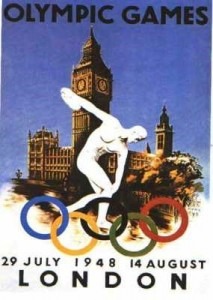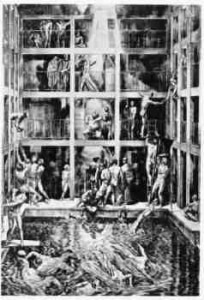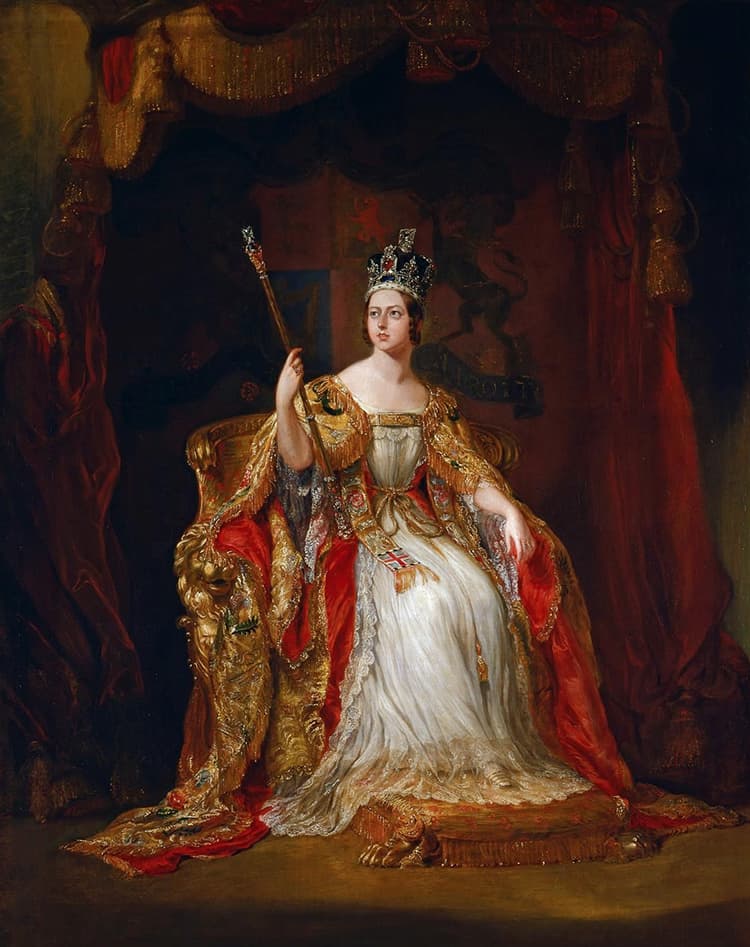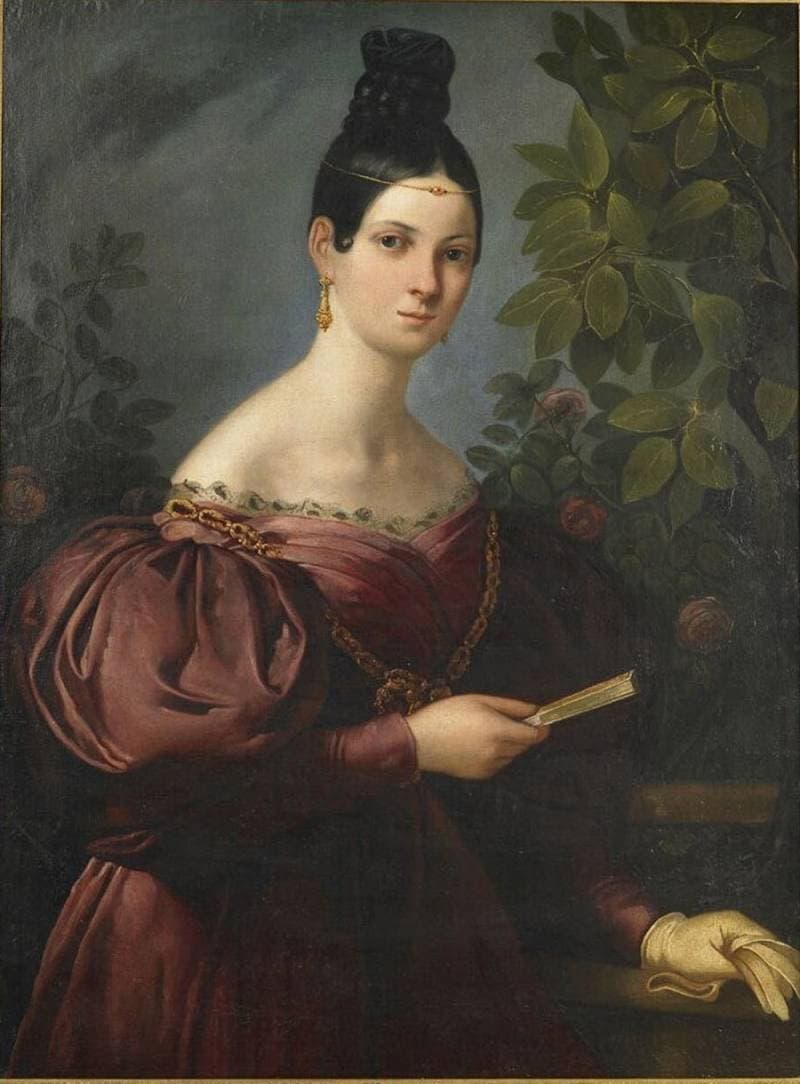 The year was 1948, and athletes from around the world gathered in London to participate in the 14th Olympic Games in the modern era. Because of World War II, it had been 12 years since the last Olympic competition, and given the economic climate and post-war rationing, the 1948 London event became known as the “Austerity Games.” Nevertheless, 4,104 athletes in 19 sport disciplines represented a record 59 nations, even though Germany and Japan were refused permission to participate and the USSR decided not to send any athletes. And while sporting venues around town were busy with everything ranging from track and field to basketball, the Art Competitions at the 1948 Summer Olympics were heating up as well! Adolf Hoch of Austria won gold in architectural designs with his model of “Ski jumping hill on the Kobenzl,” while Gustaf Nordahl of Sweden took top honors with his sculpture “Homage to Ling.” Albert Decaris of France received a gold medal for this etching “Swimming Pool,” and the British painter Alfred Reginald Thomson delighted the home crowd with his gold medal entry, the oil painting “London Amateur Championships.” The gold medal in poetry went to Aale Maria Tynni of Finnland, while Gianni Stuparich of Italy took top honors with his epic work “The Cave.” But wait, the chamber and solo music category pitted the Canadian John Jacob Weinzweig against Sergio Lauricella from Italy.
The year was 1948, and athletes from around the world gathered in London to participate in the 14th Olympic Games in the modern era. Because of World War II, it had been 12 years since the last Olympic competition, and given the economic climate and post-war rationing, the 1948 London event became known as the “Austerity Games.” Nevertheless, 4,104 athletes in 19 sport disciplines represented a record 59 nations, even though Germany and Japan were refused permission to participate and the USSR decided not to send any athletes. And while sporting venues around town were busy with everything ranging from track and field to basketball, the Art Competitions at the 1948 Summer Olympics were heating up as well! Adolf Hoch of Austria won gold in architectural designs with his model of “Ski jumping hill on the Kobenzl,” while Gustaf Nordahl of Sweden took top honors with his sculpture “Homage to Ling.” Albert Decaris of France received a gold medal for this etching “Swimming Pool,” and the British painter Alfred Reginald Thomson delighted the home crowd with his gold medal entry, the oil painting “London Amateur Championships.” The gold medal in poetry went to Aale Maria Tynni of Finnland, while Gianni Stuparich of Italy took top honors with his epic work “The Cave.” But wait, the chamber and solo music category pitted the Canadian John Jacob Weinzweig against Sergio Lauricella from Italy.
 Weinzweig, a native of Toronto, submitted the Divertimento No. 1 for flute and string orchestra. He composed the work in 1945 while in the service of the Royal Canadian Air Force. Combining his interest in 12-tone technique within a three-movement structure, Weinzweig created a work with an emphasis on the entertaining qualities of the original Classical musical genre. His opponent in the other corner was the Neapolitan composer Sergio Lauricella. Not much is known about his biography or professional life, but we do know that he submitted a Toccata for piano. In the end, the judges essentially decided on a draw, and declined to award a gold medal. As such, Weinzweig won Silver and Lauricella Bronze. And just in case you were wondering, the Polish composer Zbigniew Turski took gold for his Olympic Symphony.
Weinzweig, a native of Toronto, submitted the Divertimento No. 1 for flute and string orchestra. He composed the work in 1945 while in the service of the Royal Canadian Air Force. Combining his interest in 12-tone technique within a three-movement structure, Weinzweig created a work with an emphasis on the entertaining qualities of the original Classical musical genre. His opponent in the other corner was the Neapolitan composer Sergio Lauricella. Not much is known about his biography or professional life, but we do know that he submitted a Toccata for piano. In the end, the judges essentially decided on a draw, and declined to award a gold medal. As such, Weinzweig won Silver and Lauricella Bronze. And just in case you were wondering, the Polish composer Zbigniew Turski took gold for his Olympic Symphony.
John Weinzweig: Divertimento No. 1 for Flute and String Orchestra
You May Also Like
- Olympic Silver Medal in Musical Composition
Josef Suk: Into a New Life When the young French baron Pierre de Coubertin first proposed a major international competition to revive the ancient Greek Olympic Games, reaction was decidedly mixed. - The True Embodiment of the Olympic Spirit
Micheline Ostermeyer Pierre de Coubertin, father of the modern Olympic games strongly believed that sports and the arts had become artificially separated.
More Anecdotes
-
 Shaking for Queen Victoria What happened when Baroness Bloomfield was asked to sing for the Queen?
Shaking for Queen Victoria What happened when Baroness Bloomfield was asked to sing for the Queen? - A Tour Around Vienna
Suppé: Ein Morgen, ein Mittag, ein Abend in Wien A work by the youthful Suppé -
 Desdemona in Real Danger What happened between Manuel Garcia and his daughter Maria Malibran?
Desdemona in Real Danger What happened between Manuel Garcia and his daughter Maria Malibran? -
 Adelina Patti and Her Teacup Puppy How would you respond if you receive a Chihuahua puppy after a performance?
Adelina Patti and Her Teacup Puppy How would you respond if you receive a Chihuahua puppy after a performance?



